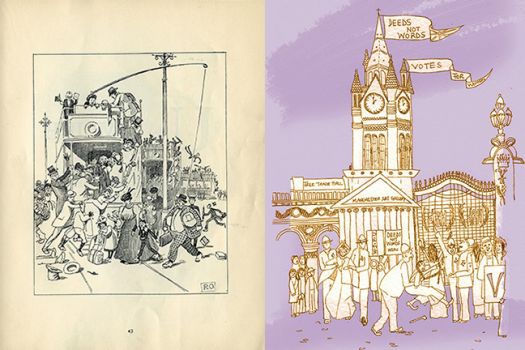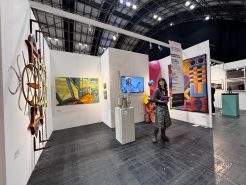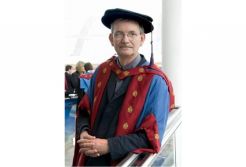“Manchester Alphabet” celebrates city through words and pictures
8 December 2015
Update to "delightful book" sure to raise a smile
The Tram Cars glide about the streets
As if they were alive,
And men and women fight for seats
Each night at half past five.
COMPLAINING about Manchester’s trams might seem like a very modern pursuit, but the verse above actually dates from almost 110 years ago, and was found in an illustrated book titled “The Manchester Alphabet”.
Written by Roger Oldham, who was killed in 1916 during the First World War, the book contains quirky and humorous poems and illustrations for every letter of the alphabet.
Along with the trains, the Manchester Guardian, the Irwell and the Lord Mayor were the subject of gentle mockery by Oldham.
Now, students from the Manchester School of Art and Manchester Writing School, along with staff from Manchester Metropolitan’s Special Collections, have updated the book for the present day.
Louise Clennell, Education and Outreach Officer at Manchester Met’s Special Collections, said: “It is a real mix of people, places and things. There are things that are very different and there are things that you can still recognise today – the trams for instance!
“It was such a delightful book and really well written and illustrated, and so I felt I wanted to update it.”
Louise discovered the book in the Manchester Society of Architects’ library while preparing for the current exhibition in Special Collections – We Built This City: Manchester Architects at 150.
She said: “It is a nice example of a collaborative project, and additionally we will be working with Historic England to create alphabets with eight local schools for an exhibition next year.”
Ian Whadcock, Senior Lecturer in Illustration with Animation at Manchester School of Art, said: “This is the third publishing collaboration for Illustration with Animation with the School of Writing over recent years, this time having the additional input and project initiation from Special Collections. The New Manchester Alphabet has served to reinforce and build on strong existing working relationships, that fall outside the scope of the day to day course programme.
“Where each project has been invaluable is by providing a sense of external professional engagement but within the structure of an academic body; the main strength is the cross over between faculties on both a staff and student level and in our case across Level 4, Level 6 and MA student cohorts. Whilst these projects are time intensive in terms of organisation and structure the students are self-selecting as participants so motivation is never an issue and the results often surprising and enlightening in respect of student ambition.”
The book will be launched on Thursday, December 10, at Manchester Art Gallery.



